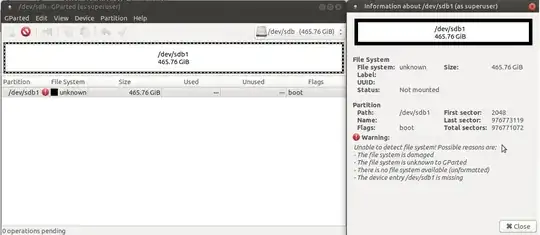I'm using Ubuntu 18.04 and I am trying to mount a usb hard drive.
The fdisk output:
Disk /dev/sdb: 465.8 GiB, 500107837440 bytes, 976773120 sectors
Units: sectors of 1 * 512 = 512 bytes
Sector size (logical/physical): 512 bytes / 4096 bytes
I/O size (minimum/optimal): 4096 bytes / 1048576 bytes
Disklabel type: dos
Disk identifier: 0x003a4817
Device Boot Start End Sectors Size Id Type
/dev/sdb1 * 2048 976773119 976771072 465.8G 7 HPFS/NTFS/exFAT
I have installed exfat-fuse and exfat-utils. When I try to mount, I get the following message:
$ sudo mount /dev/sdb /media/usb-drive
mount: /media/usb-drive: wrong fs type, bad option, bad superblock on /dev/sdb, missing codepage or helper program, or other error.
If I specify exfat in particular
$ sudo mount /dev/sdb /media/usb-drive -t exfat
FUSE exfat 1.2.8
ERROR: exFAT file system is not found.
Is the filesystem not exFAT?
Moreover, when I try to look at it in gparted:
I am not sure what is going on. Any help would be appreciated.

/dev/sdb, that is wrong. You need ot mount/dev/sdb1. – Pilot6 Mar 12 '19 at 21:59exfat. Most likely it'sntfs. – Pilot6 Mar 12 '19 at 22:00chkdskon the drive. Do NOT run ntfsfix in Ubuntu on it. – heynnema Mar 12 '19 at 23:47